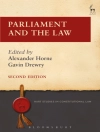Forensic science is often important in criminal cases, so criminal justice professionals, including lawyers and forensic scene investigators, must have a basic understanding of what is often complex science. This book explains the science underpinning forensic techniques to give those who engage with forensic science professionally, but who are not primarily scientists, a level of understanding that will enable them to use forensic science data effectively. In addition, the book places the use of forensic data in the context of criminal cases to assess the reliability and usefulness of forensic data in court.
Succinctly presented, this book covers all the facets of forensic science for students who are hoping to become police officers, lawyers or other members of the criminal justice system. As forensic investigations have advanced, e.g. in DNA profiling, computer modelling and behavioural sciences, so has the need for an increase in the level of scientific knowledge. The author understands the challenges this brings and has written the book to explain complex information in an accessible and undemanding style. Using international case studies, this book will bring forensic science to life and include aspects of the author’s personal journey.
Jadual kandungan
- The Whittle Case – 1976
- The History of Forensic Science
- Crime Scene Investigation
- Forensic Chemistry
- Forensic Biology
- DNA
- Fingerprints
- Forensic Pathology
- Forensic Toxicology
- Forensic Psychology
- Firearms
- Forensic Document Examination
- Probability in Forensic Science
- Presenting Evidence
- Assembling the Forensic Results












